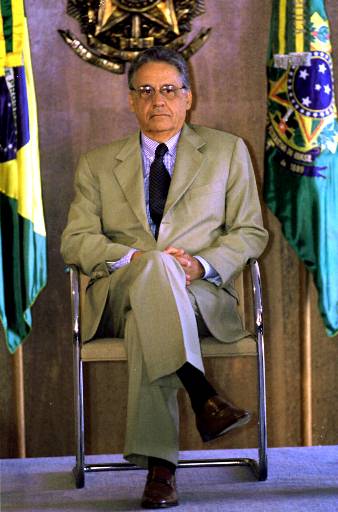REQUIRED
-
Terry Karl and Philippe C. Schmitter, "What Democracy
is…and is Not," Journal of Democracy Summer 1991, 2 (3):75-86.
-
The Economist, "The vote, but not always
much more: democracy in Latin America," October 16, 1993, p. 48.
-
Roberto Aguiar, "The Cost of Election Campaigns
in Brazil," in Herbert E. Alexander and Rei Shiratori, Comparative
Political Finance Among the Democracies (Boulder: Westview,
1994): 77-84.
-
Scott Mainwaring and Timothy R. Scully, Building
Democratic Institutions: Party Systems in Latin America (Stanford:
Stanford University Press, 1995): 354-98.
-
Guillermo O'Donnell, "On the state, democratization
and some conceptual problems: a Latin American view with glances
at some postcommunist countries," World Development, August
1993, 21 (8): 1355-1369.
-
Robert Gay, "Neighborhood Associations and Political
Change in Rio de Janeiro," Latin American Research Review,
1990, 25 (1): 102-18.
-
Elizabeth Leeds, "Cocaine and Parallel Polities
in the Brazilian Urban Periphery: Constraints on Local-Level Democratization,"
Latin American Research Review, 1996, 31 (3):47-83.
- James Holston, "The Misrule of Law: Land and Usurpation
in Brazil," Comparative Studies in Society and History, October
1991, 33 (4):695-725
RECOMMENDED
-
Gary Hoskin and Gabriel Murillo-Castano, "Can Colombia
Cope?" Journal of Democracy, January 1999, 10 (1):36-50.
-
Jorge I. Dominguez and Abraham F. Lowenthal, eds.,
Constructing Democratic Governance: The New South American Democracies
(Baltimore: Johns Hopkins University Press, 1996), p. 3-41,
58-71 (Venezuela, Colombia, and Peru).
-
Frances Hagopian, "After Regime Change: Authoritarian
Legacies, Political Representation, and the Democratic Future of
South America," World Politics, April 1993, 45 (3):464-500.
-
Robert Fatton, Jr., "The Impairments of Democracy:
Haiti in Comparative Perspective," Comparative Politics,
January 1999, 31 (2):209-30.
-
James Holston and Teresa P. R. Caldeira, "Democracy,
Law, and Violence: The Disjunctions of Brazilian Citizenship," in
Fault lines of democracy in post-transition Latin America,
edited by Felipe Aguero and Jeffrey Stark (Coral Gables, FL: North-South
Center Press/University of Miami; Boulder, CO: Lynne Rienner Publishers,
1998).
-
Scott Mainwaring, Guillermo O'Donnell, and Samuel
Valenzuela, Issues in Democratic Consolidation: The New South
American Democracies in Comparative Perspective (South Bend,
IN: University of Notre Dame Press, 1992).
-
Kurt von Mettenheim and James Malloy, Deepening
democracy in Latin America (Pittsburgh, PA: University of Pittsburgh
Press, c1998).
-
Philip D. Oxhorn and Graciela Ducatenzeiler,
What kind of democracy? What kind of market? Latin America in the
age of neoliberalism (University Park, PA: Pennsylvania State
University Press, c1998).
- Ben Ross Schneider, "Brazil under Collor: Anatomy
of a Crisis," World Policy Journal, Spring 1991: 321-47.
LITERARY OVERLAY
- The movie Central Station OR P. J. O'Rourke,
Holidays in Hell (chapter on the Philippines).
|

Brazilian president Fernando Henrique Cardoso
|
![]()
![]()
![]()
![]()
![]()